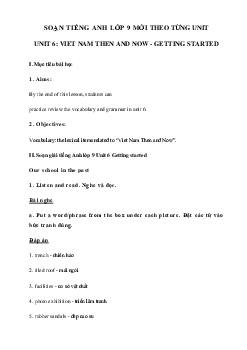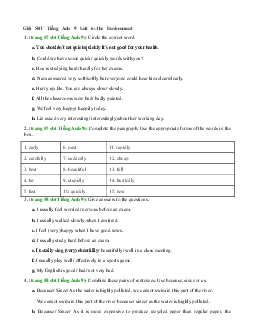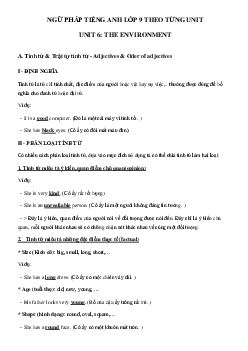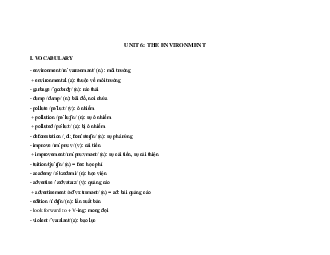
















Preview text:
UNIT 6: THE ENVIRONMENT (MÔI TRƯỜNG)
GETTING STARTED (BẮT ĐẦU)
Match these environment problems to the pictures (Ghép các vấn đề môi trường này với các hình vẽ) Gợi ý đáp án
a) air pollution (ô nhiễm không khí)
b) spraying pesticides (phun thuốc diệt sâu bọ) c) garbage dump (bãi rác)
d) water pollution (ô nhiễm nước)
e) deforestation (tàn phá rừng)
f) dynamite fishing (đánh bắt cá bằng mìn)
LISTEN AND READ (NGHE VÀ ĐỌC) Nội dung bài nghe
Mr. Brown is talking to some volunteer conservationists.
"I want everyone to listen carefully, please. First of all, I’d like you to divide into three groups. Each
group should take five plastic bags. Once you have filled a bag, come back to me as you will need
another. I need group one to walk along the shore. Group two should check the sand, and group three
has to check among the rocks. Mr. Jones is going to collect all the bags and take them to the garbage
dump. Mrs. Smith has kindly provided a picnic lunch for us, but we won’t eat until the whole area is
clean. If you can’t find your place, I will help you get there with this map. Don't worry. . . uh ... I’m
disappointed that people have spoiled this area. However, we are here to do something about this
pollution. We must all work very hard. And. if we work hard, we’ll make this beach a clean and
beautiful place again. OK. Now, let’s get started."
Ông Brown đang nói vđi người bảo vệ môi trường tình nguyện:
“Xin cảm phiền, tôi muốn mọi người hãy lắng nghe thật cẩn thận. Trước hết tôi muốn các bạn chia
thành 3 nhóm. Mỗi nhóm cần lấy 5 túi nhựa. Mỗi khi bạn có một túi đầy, hãy trở về chỗ tôi vì bạn sẽ
cần một túi khác. Tôi cần nhóm một đi dọc theo bờ biển. Nhóm hai sẽ kiểm tra cát, và nhóm ba rà
soát giữa các tảng đá. Ông John sẽ thu gom tất cả các túi và mang chúng ra bãi rác. Bà Smith đã tốt
bụng chuẩn bị một bữa ăn trưa ngoài trời cho chúng ta, nhưng chúng ta sẽ không ăn cho đến khi cả
khu vực này hoàn toàn sạch sẽ. Nếu các bạn không tìm ra vị trí của mình, tôi sẽ giúp các bạn đến đó
bằng tấm bảng đồ này. Đừng lo lắng... uh... Tôi thất vọng rằng mọi người đã làm hư hại vùng này.
Tuy nhiên, chúng ta ở đây để làm một điều gì đó đối với sự ô nhiễm này. Chúng ta phải làm việc thật
chăm chỉ. Và nếu chúng ta làm việc chăm chỉ, chúng ta sẽ làm cho bãi biển này trở lại là một nơi thật
sạch và đẹp. Được rồi. Bây giờ chúng ta hãy bắt tay vào việc.
a) Match the names in column A with the tasks in column B.
Then write the full sentence. (Kết hợp tên và nhóm ở cột A với công việc phải làm bên cột B, sau đổ viết câu hoàn chỉnh) A B
Collect all the bags and take them to the garbage Group1 dump Group 2 Check among the rocks Group 3
Provide a pinic lunch for everyone Mr Jones Give out the bags Mrs Smith Check the sand Mr Brown Walk along the shore
Group 1 - f: Group 1 Walks along the shore
Group 2 - e : Group 2 Checks the sand
Group 3 - b : Group 3 Checks among the rocks
Mr Jones - a : Mr Jones collects all the bags and takes them to the garbage dump
Mrs Smith - c : Mrs Smith provides a pinic lunch for everyone
Mr Brown - d : Mr Brown gives out the bags
b) Answer (Trả lời) 1) Mr Brown is the speaker.
(Ông Brown là người nói)
2) The listeners are the volunteer conservationists
(Người nghe là những nhà bảo tồn tình nguyện viên) 3) They are on the beach (Họ ở trên bãi biển)
4) They are going to clear the beach
(Họ chuẩn bị dọn dẹp biển)
5) If they work hard today, they will make the beach a clean and beautiful place again.
(Nếu họ làm việc chăm chỉ cả ngày hôm nay, họ sẽ làm bãi biễn trở thành một nơi sạch đẹp)
6) Yes, I have. I collected garbage in my school yards with my friends and put it in the garbage bins.
(Có tôi có. Tôi đã thu nhặt rác ở sân trường với bạn và cho nó vào thùng rác)
7) If the pollution continues, the environment might not be fresh, then our life will be damaged.
(Nếu ô nhiễm tiếp tục xảy ra, môi trường có thể không sạch, sau đó cuộc sống của chúng ta sẽ bị đe dọa) SPEAKING (NÓI)
a. Try to persuade your partner into doing the following things to protect the environment. Use
the expressions and the idea clues given. Follow the example.
(Cố gắng thuyết phục bạn cùng học làm những việc sau đây để bảo vệ môi trường. Sử dụng những
thành ngữ và những gợi ý cho sẩn. Làm theo ví dụ)
I think you should... (Tôi nghĩ bạn nên) Why don’t you... (Tại sao bạn không...?
Won’t you...? (Bạn sẽ không...?) Why not...? (Tại sao không...?)
It would be better if you... (Sẽ tốt hơn nếu bạn...) What/How
about..? Còn về việc...?)
- Use banana leaves to wrap food. (Plastic bags are very hard to dissolve/ save paper)
Dùng lá chuối để bọc thức ăn. (Những túi nhựa khó phân hủy/ tiết kiệm giấy)
- Reuse and recycle bottles and cans. (Reduce garbage/ save natural
resources) Tái sử dụng và tái chế chai lọ và hộp thiếc. (Giảm rác thải/ tiết kiệm tài nguyên thiên nhiên)
- Not throw trash onto the water. (Keep the water clean/ polluted water can
directly do harm to peopled health : kill fish/ save natural resources)
Không quăng rác lên mặt nước. (Giữ cho nước sạch/ nước ô nhiễm có thể
gây hại trực tiếp cho sức khoẻ con người: giết chết cá/ tiết kiệm tài nguyên thiên nhiên)
- Go to school or go to work by bike. (Save energy/ keep the air cleaner)
Đi học hay đi làm bằng xe đạp. (Tiết kiệm năng lượng/ giữ không khí sạch
hơn) s Put garbage bins around the schoolyard. (Prevent lazy students from
throwing trash/ keep the schoolyard clean)
- Đặt thùng rác chung quanh sân trường. (Ngăn chặn những học sinh lười
biếng quăng rác lung tung/ giữ sân trường sạch sẽ). s Use public buses instead
of motorbikes. (Avoid traffic jam/ reduce exhaust fume/ save energy)
Sử dụng xe buýt công cộng thay vì đi xe gắn máy. (Tránh kẹt xe/ giảm
lượng khí thải/ tiết kiệm năng lượng) Examples:
A : I think it would be better if we use banana leaves instead of paper or plastic
bags to wrap food. (Mình nghĩ sẽ tốt hơn nếu chúng ta dùng lá chuối để bọc
thức ăn thay vì dùng giấy và túi nhựa)
B : Why? How come? (Tại sao? Sao vậy?)
A : Because plastic bags are very hard to dissolve, they will cause pollution.
And if we use less paper, we can save trees in the forest. That;s how we can save the environment.
(Vì túi nhựa rất khó phân hủy, chúng sẽ gây ô nhiễm. Và nếu chúng ta dùng ít
giấy đi, chúng ta có thể tiết kiệm được cây trong rừng. Đó là cách chúng ta cứu môi trường)
A : I think it would be better if we reuse and recycle bottles and cans. B : Why? How come?
A : Because bottles and cans are very hard to dissolve, they will cause
pollution. And if we reuse and recycle bottles and cans, we can save natural resources.
That's how we can save the environment.
b. Find the possible answer to the questionnaire. You can use the ideas in section a.
(Tìm câu trả lời thích hợp cho báng câu hỏi, Bạn có thể sử dụng ý kiến ỏ phẩn a) Questionnaire
Protecting the environment
How can • Prevent littering? (ngăn chặn xả we... • Save paper? rác bừa bãi) (tiết kiệm giấy?) • Use fewer plastic
• Reduce air pollution (giảm ô bags? (dùng ít túi nhựa nhiễm không khí) hơn?) • Reduce water
• Reduce the amount of garbage we pollution? (giảm Ô nhiễm
produce? (giảm lượng rác chúng ta thải ra) nước?) Possible answers How can we save paper?
I think we should write on both sides of the paper How can we use fewer plastic bags?
I think we should save plastic bags, clean and reuse them.
How can we reduce water pollution?
I think we shouldn;t throw wastes and garbage into sưeams, lakes and even oceans. How can we prevent littering?
I think we should discard/throw garbage in waste bins.
How can we reduce air pollution?
I think we should use less private vehicles and don't release pollutants into the air. How can we
reduce the amount of garbage we produce?
- I think we should try to re-use and recycle things.
c. Now discuss with a partner the best way to protect the environment. Take turns to try and persuade
your partner into doing things you think the most practical. Use the ideas and the expressions for
persuading in section a) and the answers to the questionnaire in b). (Bây giờ hãy thảo luận với bạn
cùng học về cách tốt nhất để bảo vệ môi trường. Thay phiên nhau cố gắng thuyết phục bạn cùng học
làm những việc bạn nghĩ là thiết thực nhất. Dùng những ý kiến và thành ngữ trong việc thuyết phục ở
phần a và những câu trả lời cho bảng câu hỏi ở phần b) Examples (Ví dụ)
I think we should burn trash to reduce the amount of garbage we produce to protect the environment.
(Tôi nghĩ chúng ta nên đốt những vật bỏ đi để làm giảm lượng rác chúng ta thải ra nhằm bảo vệ môi trường)
No, we shouldnỵt do that. Burning trash will pollute the air. I think the best way to reduce garbage is
to reuse and recycle things. (Không, chúng ta không nên làm như vậy. Đốt rác sẽ ô nhiễm không khí.
Tôi nghĩ cách tốt nhất để giảm lượng rác thải là tái sử dụng và tái chế chúng)
How can we do that? I think only the factory can. (Làm sao chúng ta làm được? Tôi nghĩ chỉ có nhà
máy mới có thể làm được thôi)
What about collecting used paper, bottles and cans every day? Its not difficult. (Thế thu nhặt giấy đã
dùng, chai lọ và hộp thiếc mỗi ngày thì sao? Điều đó đâu có khó)
That's a good idea. Let's do that. (Quả là một ý kiến hay. Chúng ta hãy cùng làm việc đó). LISTENING (NGHE)
Listen to the report on how oceans are polluted. Then complete the notes.
(Lắng nghe bài báo cáo về việc ô nhiễm đại dương. Sau đó điền thông tin vào bảng ghi chú)
How the oceans are polluted Firstly : raw sewage pumped directly into the sea
Secondly : garbage is dropped into the sea Thirdly : oil spills come from ships at sea
Next : waste material from factories
Finally : oil is washed from land Lời trong băng
Our oceans are becoming extremely polluted. Most of this pollution comes from the land, which
means it comes from people. First, there is raw sewerage, which is pumbed directly into the sea.
Many countries, both developed and developing, are guilty of doing this. Secondly, ships drop about
6 million tons of garbage into the sea each year. Thirdly, there are oil spills from ships. A ship has an
accident and oil leaks from the vessel. This not only pollutes the water, but it also kills marine life.
Next, there are waste materials from factories. Without proper regulations, factory owners let the
waste run directly into the rivers, which then leads to the sea. And finally, oil is washed from land.
This can be the result of carelessness or a deliberate dumping of waste. READING (ĐỌC)
Read this poem about the environment. (Đọc bài thơ về môi trường) Mẹ ơi Mẹ
“Mẹ ơi Mẹ, chuyện gì sẽ xảy ra
Nếu ô nhiễm vẫn luôn cứ tiếp diễn?”
“À! Thế giới sẽ thành bãi phế thải,
Và tất cả kho tàng sẽ tiêu tan.
5 Túi nhựa và lon bừa bãi đầy đồng
Và những dòng suối phủ đầy bọt nước
Mọi người vẩn quẳng chai qua hàng rào,
Hãy cứu chúng tôi, hãy mang chúng về
“Nhưng Mẹ ơi Mẹ, nếu con quẳng chai,
10 Sẽ không có làm ô nhiễm rừng chứ?”
“Thật là bậy bạ, làm thế cũng sai,
Con hãy yên lặng và ngoan đi nhé.
Nếu con tính làm chuyện gì ngớ ngẩn,
Mẹ sẽ lập tức dẫn con về nhà.
15 Vì ô nhiễm là do những người khác,
Mẹ con mình hãy tận hưởng ngày vui”.
a) Match each word in A to an appropriate explanation in B
(Kết hợp mỗi từ bên cột A với lời định nghĩa đúng bên B) A B 1. Junk - yard a) row of things forming a fence 2. end up b) people 3. treasure c) a piece of land full of 4. foam rubbish 5. stream d) a flow of water 6. hedge e) mass of bubbles of air or gas 7. folk
f) valuable or precious things g) reach a state of
1. junk - yard - c) a piece of land full of rubbish
2. end up - g) reach a state of
3. treasure - f) valuable or precious things
4. foam - e) mass of bubbles of air or gas
5. stream - d) a flow of water
6. hedge - a) a row of things forming a fence 7. folk - b) people
b) Answer. Then write the answers in your exercise book
(Trả lời câu hỏi. Sau đó viết câu trả lời vào vở bài tập của em)
1) If all the pollution goes on, the world will end up like a second - hand junk - yard
2) The mother thinks other folk (people) pollute the environment but not her and her son
3) If the boy keeps on asking such questions, his mother will take him home right away.
4) No, I don't think so, because it shows that the boy is interested in environmental pollution
5) The poet wants US to leann that everyone is responsible for keeping the environment from pollution.
6) To minimize pollution, I could pick up the rubbish and throw it into a trash bin. I should not litter on the ground. WRITE (VIẾT)
A complaint letter has five sections
Situation (Tình huống) states the reason for writing (tuyên bố lý do viết)
Complication (Vấn đề) mentions the problem (đề cập vấn đề)
Resolution (Giải pháp) makes a suggestion (đưa ra một đề nghị)
Action (Hành động) talks about future action (nói về hành động tương lai)
Politeness (Lịch sự) ends the letter politely (kết thúc lá thư một cách lịch sự)
a) Mr.Nhat wrote a complaint letter to the director of L &p Company in Ho Chi Minh City. The five
sections of the letter are not in the right order. Label each section with the appropriate letter : S, C, R,
A, or P. (Ông Nhật viết một bức thư khiếu nại với giám đốc Công ty L&p. Năm phần của lá thư
không được sắp xếp đúng thứ tự. Hãy ghi tên mỗi phần với chữ cái thích hợp : S, C, R, A hay P) 26 đường Trần Phú Hà Nội Ngày 9 tháng 10 năm 2003 Giám đốc Công ty Vận tải L&p 431 Đại lộ Lê Lợi Thành Phố Hồ Chí Minh Kính thưa Ông/ Bà,
Tôi muôn đề nghị rằng công ty của ông/ bà nên nói vđi những tài xế của mình dọn dẹp sạch sẽ mọi
thứ trên đất trước khi đi.
Tôi viết cho ông/ bà về việc các xe tải của ông đỗ lại nghỉ quanh nhà tôi trên đường ra Bắc.
Tôi mong sẽ nghe và thấy được những phản hồi tốt đẹp từ công ty của ông/ bà. Khi xe tải của công ty
ông/ bà đỗ lại nghỉ ngơi một chôc trên đường, quanh nhà tôi, các tài xê đã để lại rất nhiều rác trên đất
sau khi họ nghỉ ngơi. Khi xe tải rời đi, mặt đât đầy những rác rưởi và chỉ vài phút sau là chúng bốc mùi và đầy ruồi. Chân thành cảm ơn,
Trần Vũ Nhật Dear Sir/ Madame Tran Vu Nhat
b) These days, many people begin to catch fish in the lake behind your house. What makes you
worried is they use electricity to catch fish. A lot of small fish died 76
and floated on the water surface. Other animals such as frogs, toads, and even birds have also died
from electric shock waves. You think that local authorities should prohibit and fine heavily anyone
using this way of catching fish.
(Hổm rày, nhiều người bắt đầu bắt cá ở cái hồ sau nhà bạn. Điều làm bạn lo lắng nhất là họ dùng điện
để bắt cá. Rất nhiều cá nhỏ đà chết và nổi lềnh bềnh trên mặt nước. Những con vật khác như ếch, cóc,
và thậm chí cả chim cũng chết do bị điện giật. Bạn nghĩ rằng chính quyền địa phương nên nghiêm
cấm và phạt thật nặng những ai dùng cách đó để bắt cá)
Now, write a letter to the head of the local authorities to complaint about the way of catching fish in
the lake behind your house. Following SCRAP format. Begin with : Dear Mr. President,
I am writing to you about the problem of fish catching in the lake behind my house...
(Bây giờ, hãy viết một lá thư cho lãnh đạo của chính quyền địa phương để phàn nàn về việc bắt cá ở
cái hồ sau nhà bạn. Làm theo dạng SCRAP. Bắt đầu với:
Kính gởi Ngài Chủ Tịch
Tôi viết lá thư này để trình bày về việc bắt cá trong hồ sau nhà tôi...) Suggested letter. Dear Mr President,
I am writing to you about the problem of fish catching in the lake behind my house.
I am very worried because they don;t use fishing rod or net but use electricity to catch fish. After a
short time they leave the lake a lot of small fish died and floated on the water surface. Other animals
such as frogs, toads and even birds have also died from electric shock waves.
I would suggest the local authorities should prohibit and fine heavily anyone using this way of catching fish.
I look forward to hearing from you and seeing the protection of environment from the local authorities. Sincerely, LANGUAGE FOCUS
• Adjectives and adverbs
• Adverb clauses of reason (as, because)
• Adjective +That - clause
• Conditional sentences type 1
1) Change the adjectives into adverbs. Then use the adverles to complete the sentences
(Đổi tính từ thành phó từ. Sau đó dùng phó từ để hoàn thành câu) Adjective Adverb Extreme Extremely Happy Well Sad Happily Slow Slowly
b) Hoa was extremely pleased because she got an A for her assignment.
c) The old man walked slowly to the park.
d) Tuan sighed sadly when he heard that he failed the test.
e) The baby laughed happily as she played with her toys.
f) Mrs Nga speaks English quite well.
2) Join the pairs of sentences together. Use because, as, or since.
(Nối các cặp câu. Dùng because, as hoặc since)
a) iVn tired because I stayed up late watching TV.
b) I have a broken leg as I fell over while I was playing basketball.
c) I'm going to be late for school since/because the bus is late.
d) I broke the cup as/because I was careless.
e) I want to go home because/as I feel sick.
f) I'm hungry because/since I haven^ eaten all day.
3) Complete the dialogues. Use the words in brackets
(Hoàn tất bài đôi thoại. Dùng từ trong ngoặc)
a) Ba: Dad ! I got mark 9 on my test!
Mr Ha: That's wonderful. I'm pleased that you are working hard.
b) Mrs Quyen : When are you going on vacation with your family, Sally?
Mrs Robinson : Tomorrow. Im excited that I can go to Dalat this time.
c) Lan : I'm sorry that I broke your bicycle yesterday.
Tien : Don't worry. I can fix it.
d) Liz : I forgot to tell you I was going to Lan;s place.
Mrs Robinson : I'm disappointed that you did not phone me about it
e) Miss Lien : Congratulations !
Nga : I'm amazed that I could win the first prize
4) Match each half - sentence in column A with a suitable one in column B. (Kốt hợp nửa câu
bên cột A vđi nửa câu bên cột B)
a) If we pollute the water, we will have no fresh water to use.
b) If you cut down the trees in the forests, there will be big floods every year.
c) If there is too much exhaust fume in the air, more and more people will cope with respiratory problems.
d) If you can keep your neighborhood clean, you will have an ideal place to live.
e) If people stop using dynamite for fishing, a lot of sea creatures will be well preserved
5) Complete the sentence (Hoàn tất câu)
a) If we go on littering, the environment will become seriously polluted.
b) If we plant more trees along the streets, we will have more shades and fresh air.
c) If we use much pesticide on vegetables, the vegetables will become poisonous and inedible.
d) If we keep our environment clear and clean, we will live a happier and healthier life.



